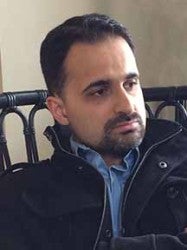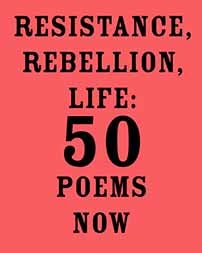- Home •
- Books by Category •
- Imprints •
- News •
- Videos •
- Media Center •
- Reading Group Center
Media Center: ‘Resistance Rebellion Life’ Edited by Amit Majmudar

WHO: Fifty of our most celebrated poets
WHAT: RESISTANCE, REBELLION, LIFE:
50 Poems Now.
Edited and introduced by Amit Majmudar.
WHEN: Published by Knopf May 24, 2017
WHERE: Voices from across America.
WHY: In a political atmosphere where language and even meaning itself are continually under threat, poetry has a critical role to play.
And our poets have been responding—in the streets and at their desks, demanding a full accounting from themselves and from their nation. Amit Majmudar’s elegant introduction to these vital poems reminds us that “false stories take a lot of killing because they are made of language. Because they are made of language, though, they can be killed.”
From Solmaz Sharif and Eileen Myles to Kevin Young and Juan Felipe Herrera, American poets of diverse styles and strategies have contributed their truths: scenes from the front lines of resistance, and from the interior of our collective conscience. A final cento by Majmudar — a poem including at least one line or phrase from each of the poems in the volume — celebrates the robust multiplicity of voices in this book and in America now.
. . . . .
From the introduction
by Amit Majmudar
What is truth?
If there was a response to Pontius Pilate’s question, it hasn’t been recorded. The question itself is, fittingly, inscrutable. Depending on where you place the stress, how you intone it, Pilate’s question can mean different things.
The first is curiosity. This was a man of the world, after all. He wanted to know what the truth was—or, more accurately, what his prisoner meant by “truth.” Even if we imagine Pilate had a genuine desire to know, his idea of truth was shot through with subjectivity. It did not refer to a constant. Pilate was treating “truth” as an unfamiliar, Aramaic term, and he wanted to know what this holy rabble-rouser was on about. As a Roman, Pilate probably had his own sense of truth—one that marched under the standard of an eagle.
Of course, there are other possibilities. He might have asked the ancient Latin equivalent of: What is truth? What is truth, anyway? People talk about it a lot, but who’s to say what it really is? Is it even something we can discuss seriously, as two grown men in a riotous city? This is a time for decision-making. Let us speak of conditions here and now—this civil unrest, for example—and the measures to be taken.
Another possibility. This one would place the emphasis, contemptuously, on the last word. What is truth that you act like it deserves so much awe? What is truth — that I, the man in charge here, should fear it?
All of literature tries to answer that question in some way or another. But poets ask that question of themselves in a way that would have been alien to a purely political animal like Pontius Pilate. They ask it the way the desperate Seeker in a parable asks the bearded Sage on a mountaintop. What is truth?
 Media Resources:
Media Resources:
About the book and editor | Download the jacket | Download the author photo
Knopf. Trade paperback original. 96 pages. $12.95 ISBN 978-1-524-71132-0
To interview the editor, contact:
Josie Kals | 212-572-2565 | jkals@penguinrandomhouse.com